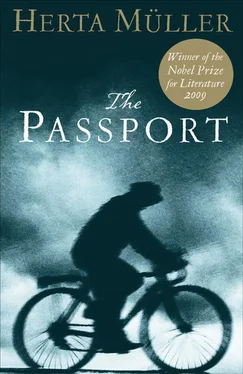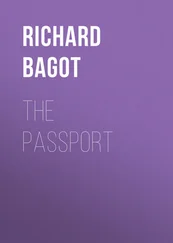Herta Müller
•THE• PASSPORT
Translated by Martin Chalmers
The white appears in the eyelid fissure between East and West. The pupil is not to be seen.
INGEBORG BACHMANN
Around the war memorial are roses. They form a thicket. So overgrown that they suffocate the grass. Their blooms are white, rolled tight like paper. They rustle. Dawn is breaking. Soon it will be day.
Every morning, as he cycles alone along the road to the mill, Windisch counts the day. In front of the war memorial he counts the years. By the first poplar tree beyond it, where he always hits the same pot hole, he counts the days. And in the evening, when Windisch locks up the mill, he counts the years and the days once again.
He can see the small white roses, the war memorial and the poplar tree from far away. And when it is foggy, the white of the roses and the white of the stone is close in front of him as he rides. Windisch rides on. Windisch’s face is damp, and he rides till he’s there. Twice the thorns on the rose thicket were bare and the weeds underneath were rusty. Twice the poplar was so bare that its wood almost split. Twice there was snow on the paths.
Windisch counts two years by the war memorial and two hundred and twenty-one days in the pot hole by the poplar.
Every day when Windisch is jolted by the pot hole, he thinks, “The end is here.” Since Windisch made the decision to emigrate, he sees the end everywhere in the village. And time standing still for those who want to stay. And Windisch sees that the night watchman will stay beyond the end.
And after Windisch has counted two hundred and twenty-one days and the pot hole has jolted him, he gets off for the first time. He leans the bicycle against the poplar tree. His steps are loud. Wild pigeons flutter out of the churchyard. They are as grey as the light. Only the noise makes them different.
Windisch crosses himself. The door latch is wet. It sticks to Windisch’s hand. The church door is locked. Saint Anthony is on the other side of the wall. He is carrying a white lily and a brown book. He is locked in.
Windisch shivers. He looks down the street. Where it ends, the grass beats into the village. A man is walking at the end of the street. The man is a black thread walking into the field. The waves of grass lift him above the ground.
The mill is silent. The walls are silent and the roof is silent. And the wheels are silent. Windisch has pressed the switch and put out the light. Between the wheels it is night. The dark air has swallowed the flour dust, the flies, the sacks.
The night watchman is sitting on the mill bench. He’s sleeping. His mouth is open. The eyes of his dog gleam under the bench.
Windisch carries the sack with his hands and with his knees. He leans it against the wall of the mill. The dog looks and yawns. Its white teeth set wide.
The key turns in the keyhole of the mill door. The lock clicks between Windisch’s fingers. Windisch counts. Windisch feels his temples beating and thinks, “My head is a clock.” He puts the key in his pocket. The dog barks. “I’ll wind it up, till the spring snaps,” says Windisch out loud.
The night watchman presses his hat down onto his forehead. He opens his eyes and yawns. “Soldier on guard duty,” he says.
Windisch walks over to the mill pond. At the edge is a stack of straw. A dark blot on the reflection in the pond. The blot goes down into the depths like a crater. Windisch pulls his bicycle out of the straw.
“There’s a rat in the straw,” says the night watchman. Windisch picks the blades of straw from the saddle. He throws them into the water. “I saw it,” he says, “it threw itself into the water.” The blades float like hair. They turn in small eddies. The dark crater floats. Windisch looks at his moving reflection.
The night watchman kicks the dog in the stomach. The dog yelps. Windisch looks into the crater and hears the yelping under the water. “The nights are long,” says the night watchman. Windisch takes a step backwards. Away from the edge. He sees the unchanging picture of the stack of straw, facing away from the edge. It is still. It has nothing to do with the crater. It is paler than the night.
The newspaper rustles. The night watchman says, “My stomach is empty.” He takes out some bread and bacon. The knife flashes in his hand. He chews. He scratches his wrist with the blade of the knife.
Windisch wheels the bicycle along. He looks at the moon. Still chewing, the night watchman quietly says, “A man is nothing but a pheasant in the world.” Windisch lifts the sack and lays it on the bicycle. “A man is strong,” he says, “stronger than the beasts.”
A corner of the newspaper is flying loose. The wind tugs like a hand. The night watchman lays the knife on the bench. “I slept a little,” he says. Windisch is bent over his bicycle. He raises his head. “And I woke you,” he says. “Not you,” says the night watchman, “my wife woke me.” He brushes the breadcrumbs from his jacket. “I knew,” he says, “that I wouldn’t be able to sleep. The moon is large. I dreamt of the dry frog. I was dead tired. And I couldn’t get to sleep. The earth frog was lying in bed. I was talking to my wife. The earth frog looked with my wife’s eyes. It had my wife’s plait. It had her nightshirt on, which had ridden up to the stomach. I said, cover yourself, your thighs are flabby. I said it to my wife. The earth frog pulled the nightshirt over its thighs. I sat down on the chair beside the bed. The earth frog smiled with my wife’s mouth. The chair is creaking, it said. The chair hadn’t creaked. The earth frog had laid my wife’s plait across its shoulder. It was as long as the nightshirt. I said: Your hair has grown. The earth frog raised its head and shouted: You’re drunk, you’re going to fall off the chair.”
The moon has a red patch of cloud. Windisch leans against the wall of the mill. “Men are stupid,” says the night watchman, “and always ready to forgive.” The dog eats a bacon rind. “I forgave her over the baker. I forgave her for what happened in town.” He strokes the blade of the knife with his finger tip: “The whole village laughed at me.” Windisch sighs. “I couldn’t look her in the eye anymore,” says the night watchman. “Only one thing I didn’t forgive her — that she died so quickly, as if she’d had no one.”
“God knows,” says Windisch, “what they’re for, women.” The night watchman shrugs his shoulders: “Not for us,” he says. “Not for me, not for you. I don’t know who they’re for.” The night watchman strokes the dog. “And our daughters,” says Windisch. “ God knows, they become women too.”
There’s a shadow on the bicycle, and a shadow on the grass. “My daughter,” says Windisch, weighing the sentence in his head, “my Amalie is no longer a virgin either.” The night watchman looks at the red patch of cloud. “My daughter has calves like melons,” says Windisch. “As you said, I can’t look her in the eye any more. There’s a shadow in her eyes.” The dog turns its head. “Eyes lie,” says the night watchman, “but calves don’t.” He places his feet apart. “Watch how your daughter walks,” he says. “If the toes of her shoes point outwards when she puts her feet on the ground, then it’s happened.”
The night watchman turns his hat in his hand. The dog lies and watches. Windisch is silent. “Dew is falling. The flour will get damp,” says the night watchman, “the mayor will be annoyed.”
A bird is flying over the pond. Slow and straight as if drawn along on a string. Close to the water. As if it were ground. Windisch follows it with his eyes. “Like a cat,” he says. “An owl,” says the night watchman. He puts his hand to his mouth. “The light at Widow Kroner’s has been burning for three nights.” Windisch pushes his bicycle. “She can’t die,” he says, “the owl hasn’t settled on any roof yet.”
Читать дальше












